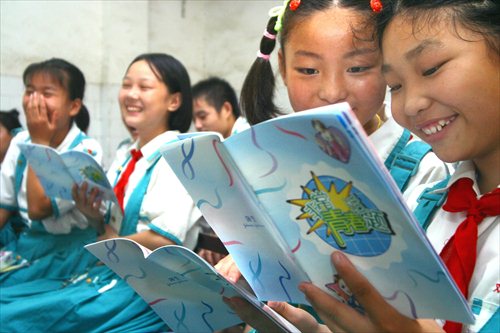Sex education varies across schools
ABCs and birds and bees
A high school sex education textbook issued in Jiangxi Province tells readers that premarital sex has a tremendous negative psychological and physical effect on girls, and states that girls who surrender their virginity to male "conquerors" will be regarded as "cheap." There is no mention of how boys having sex might be considered.
The gender-biased notions in the textbook have sparked heated debates on Weibo. Some online users questioned why the author blames only girls for premarital sex and doesn't mention boys. Others asked how this sex-ed textbook was allowed to be published and distributed.
Following up on this debate about sex education in China's high schools and to gain an insight into the curriculum, teaching staff and educational materials of today's sex-education courses in Shanghai, the Global Times talked to a teacher, two city students and a sex-education expert.

An optional course
Pan Ying is 18 and has just graduated from Yangjing Senior High School, a key high school in the city.
She said that her high school had offered an optional psychology course that includes sex education for first- and second-year students.
"I was quite interested in psychology, so I chose the course," Pan said. "But only after I had been to two classes did I realize this course was mainly about sex and reproduction."
She said the course was run by an experienced psychology teacher at her school, and covered topics like sexual relationships, contraception, pregnancy and fertility.
"I found the teacher was professional and open-minded. She didn't seem to be shy talking about sex," she said.
But Pan noted that there were no textbooks for the class, and the course content was completely designed by the teacher and shown on PowerPoint. Occasionally, the teacher would show videos or online references to illustrate points.
For Pan, the most interesting part of the course was about contraception. "The teacher played a short video to the class showing how to use condoms before sex. She also told us to take the morning-after pill immediately after unprotected sex," she said. "I would never have thought about these things if the teacher hadn't talked about them."
However there were only about 10 students taking the course - and eight of them were girls.
High school student Chen Ningjing researched how city high schools teach sex. The 18-year-old and three classmates found that few high schools in the city run sex-education classes.
"I didn't have any sex-ed classes in high school, and most of my friends and classmates told me that their high schools have no sex-ed courses," Chen said. "Only very basic sex facts might be outlined in biology lessons."
Parents say nothing
Both Pan and Chen said their parents had never talked about sex with them and anything they knew as teenagers came from the Internet, friends, magazines and books.
At middle school, Chen found her secondary sex characteristics developing, but neither her parents nor teachers explained these changes to her.
She found some help when she read the book A Girl's Diary by the best-selling children's fiction writer Yang Hongying, and learned that her physical changes were normal during adolescence.
"The author also wrote about how to choose a suitable bra, as well as dos and don'ts during menstruation," she said.
Online research has revealed that only 0.9 percent of Chinese adolescents learn about sex from their teachers or parents. About 32.2 percent of them said they learn about sex online and 24.4 percent said they get their sexual knowledge from pornography.
Xu Lin is an experienced psychology teacher at Yangjing Senior High School and has been teaching sex education at the school since 2001. She has a master's degree in psychology and health education from East China Normal University.
Xu said very few local high schools offer sex-ed courses, and the quality of these vary greatly from school to school.
"While some schools have hired professional teachers to run sex-ed courses and seminars, some schools have no sex-ed activities or classes at all," she said.
She said most city high schools don't have specialized sex-ed textbooks or teaching staff, and the subject is usually taught by psychology or biology teachers or principals.
"Though the local education administration has put a lot of emphasis on sex education in secondary schools, because of the shortage of qualified teachers and opposition from conservative school leaders and parents, it's a big challenge trying to expand sex education throughout Shanghai's middle schools and high schools," Xu said.

Primary school students in Nanjing read their sex-ed textbooks. Photos: IC
A beautiful thingHer own courses focus on four aspects. "First is to guide students to perceive sex as a beautiful thing rather than something obscene or horrible. Knowledge about how to get along with the opposite sex is also important for high school students," she said.
"Another focus of my class is about contraception. I tell the boys to be responsible with girls, and I tell girls to protect themselves during sex," she said.
"It is also important to inform teenagers of the dangers of having unsafe sex, like contracting HIV or sexually transmitted diseases."
Sex-education expert Fang Gang told the Global Times that he is very disappointed with the state of sex education.
"My percentage score for China's sex education at present is only 10 - a few years ago it was 54," he said. "I haven't seen any improvement in the field over the past few years. Most schools still don't have any sex-ed courses. Only a few high schools offer optional courses."
He said that properly qualified sex-ed teachers and textbooks were rare across the country, and most of the Chinese sex-ed textbooks are problematic.
"One thing is that many textbooks overemphasize physical and psychological knowledge rather than values. But for adolescents, proper values matter more than basic knowledge," Fang said.
"Also, almost all the existing textbooks suppose all students are heterosexual and don't mention homosexuality, and this tends to harden discrimination against homosexuality," he added.
Abstinence-only education
Fang said another problem was that a large proportion of the current sex-education textbooks and courses in China promote abstinence-only sex education, and the Jiangxi textbooks was a good example.
"I attended a national meeting of sex-ed teachers last week, and most participants were university lecturers. But to my surprise, over 50 percent of them advocate abstinence-only sex education," he said.
Abstinence-only sex education forbids any sexual activities outside marriage, and, Fang said, often uses threats and punishments to discourage adolescent sex.
He said that this kind of sex education particularly focused on the bad and negative sides of sex, such as pregnancy, abortion and disease, and avoids actually mentioning sex itself.
This type of sex education also often degrades women who have had premarital sexual experiences. "In essence, it's fear-based sex education," he said.
He said abstinence-only sex education has been proved to be impractical and harmful. He said many cases in the US show that many adolescents who have undertaken abstinence-only sex education still had premarital sex, and they were more likely to suffer from unexpected pregnancies and disease.
"Since the educators avoid any practical knowledge about sex and contraception when their students have actual sex, they don't learn how to protect themselves from diseases or pregnancy."
Xu, the psychology teacher, said that every individual has a right to decide when to first have sex, and there is no right or wrong about it.
"The purpose of sex education is to help students learn how to protect themselves and be responsible for their behavior," she said.
This theme was echoed by Chen, the student, who said some of her high school peers had already had sex and that they used condoms.
"As long as you know how to protect yourself and your partner, there is nothing wrong with it," she said.
All of the people interviewed agreed that it is too late to start sex education in highs schools.
Chen said that most boys and girls were experiencing physical development in middle school, and it would help a lot if middle schools could organize sex-ed lectures and seminars to help students understand their physical and psychological changes.
Xu said sex education should start earlier. "Kids at kindergarten ask their teachers how they come into this world. We have all kinds of questions about sex at different stages of life, and we are not likely to figure out all the questions by ourselves without systematic and scientific sex education," she said.
Both Xu and Fang said that today's teenagers are open-minded and willing to learn about sex.
Xu said she has found most of her students are interested in the sex-ed classes, and respond that what they learn is useful.
"Some of my graduates tell me that my sex-ed courses at high school helped them develop responsible attitudes toward sex," she said.